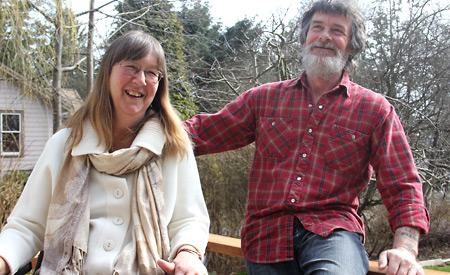Amyotrophic Lateral Sclerosis (ALS), or Lou Gehrig’s disease, comes on quick, out of nowhere and leaves no chance for survival, yet relatively little is known about the disorder.
On Saturday, April 9 a group of dedicated supporters will head out for the fifth consecutive year to try and change that. The eight kilometre walk for ALS, taking place in Okeover along Crowther Road, is a chance for the public to come out and help raise awareness about the disorder and money to support research and patient services. Participants collect pledges and proceeds go to the ALS Society of BC.
ALS is a motor neuron disease that is seemingly random, progressive and fatal. No cure exists and little is understood about how it works or what causes it. The disease causes nerve cells in the brain and spine to break down which in turn causes those affected to lose control of voluntary muscle function. Most people with ALS lose the ability to walk in the early stages and in later stages the ability to talk, eat or breathe. Most die within five years of diagnosis.
Frankie Kellner started the walk after her friend and current co-organizer Susan Hanson’s husband Harley was diagnosed with ALS. Harley made it out to the first event but died in 2007, one year after his diagnosis. Thirty people took part that year and organizers raised $3,000. Last year about 100 people took part, raising over $13,000. Kellner and Hanson hope to raise $20,000 this year.
“It means so much to me, for my husband’s memory, for people to come,” said Hanson. “It gives people a chance to say we’re behind you, we’re here for you and we’re in your corner.”
Dorothy Rigby has been living with ALS for four years. She uses a wheelchair but for her the progression of the disease has been considerably slower than it is for many. The disease started with a tingling sensation in Rigby’s left foot. She found herself tripping more than usual and losing her balance as her foot and eventually her leg got weaker. She now uses a wheelchair but feels lucky to be doing so well after so long.
“It’s quite a disease,” said Rigby. “I’m learning every day. You have to develop ways of coping, you’re always adjusting because it progresses gradually and you sort of gradually go downhill. You don’t ever get better, it just keeps on going. So you’re always looking for ways of doing things differently.”
The ALS Society of BC covers the costs of equipment essential for those with ALS. By the society’s own numbers a person with ALS could require nearly $100,000 worth of equipment, including a power wheelchair, text-to-speech communication device and respiratory equipment, over the course of the disease. The money from walks held across Canada goes toward helping with these costs.
The society is also the main source of funding for ALS research. The diagnosis rate for ALS is almost on par with the death rate for ALS, so the number of those living with the disease stays relatively similar, around 3,000 in Canada. The rarity of the disease and short lifespan for those diagnosed makes research challenging.
Check in for the walk starts at 9 am at the Laughing Oyster Restaurant, with the walk starting at 10 am. There is an alternative route for wheelchairs. A benefit lunch hosted by Laughing Oyster will follow the walk with part of the proceeds going toward ALS. Reservations are necessary. There will also be a silent auction and a balloon bonanza prize contest, featuring two packages of two return trips to Vancouver from Pacific Coastal Airlines. For more information readers can call Kellner at 604.483.2277 or Hanson at 604.414.0318.



